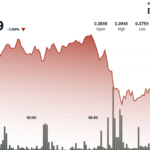In a significant move to reshape corporate reporting practices, President Donald Trump has proposed ending the long-standing requirement for public companies to report their financial results quarterly. This change aims to address concerns over short-term thinking prevalent among corporate executives who prioritize immediate investor reactions.
In a post on Truth Social, Trump articulated his views, suggesting that companies should only report their results biannually instead of on a quarterly basis. He emphasized that this shift would not only be cost-effective but would also enable managers to concentrate on the long-term health of their businesses. Trump remarked, “Did you ever hear the statement that, ‘China has a 50 to 100 year view on management of a company, whereas we run our companies on a quarterly basis???’ Not good!!!!”
This perspective resonates with previous critiques from notable figures in finance, such as JPMorgan Chase CEO Jamie Dimon and investment pioneer Warren Buffett, who have similarly cautioned against the drawbacks of quarterly capitalism. In 2016, Hillary Clinton, Trump’s opponent in the presidential race, expressed her own concerns regarding the issue, highlighting a pervasive distress about a focus on short-term gains.
Advocates for Trump’s proposal argue that an emphasis on quarterly earnings reports encourages corporate America to prioritize short-lived stock price boosts over sustainable growth. They assert that the regulatory burdens associated with these frequent updates have contributed to the declining number of public companies in the United States.
Trump acknowledged that any alteration to reporting frequency would necessitate approval from the Securities and Exchange Commission (SEC), recognizing the regulatory oversight involved. The SEC may be faced with decisions regarding such a significant change soon, especially with news emerging from sources like The Wall Street Journal about the Long-Term Stock Exchange’s initiative. This exchange, which has support from influential investors like Andreessen Horowitz and Founders Fund, plans to petition the SEC to eliminate the quarterly earnings report requirement in favor of a six-month reporting system. Long-Term Stock Exchange CEO Bill Harts stated, “This is an idea whose time has come,” reinforcing claims of regulatory burdens faced by public companies.
In the past, Trump has previously urged the SEC to explore the six-month reporting model, advocating for increased flexibility and cost savings. However, stakeholders such as shareholders, economists, and policymakers have come to depend on the timely financial disclosures that accompany quarterly reporting. These frequent updates provide crucial insights into economic indicators, such as fluctuations in travel demand reported by airlines or early warnings on loan performances from major banks. Additionally, reports from technology companies can shed light on developments within rapidly evolving sectors, including artificial intelligence.
Transitioning to a six-month reporting cycle could potentially lead to delays in obtaining valuable information, raising concerns that it may inflate stock price volatility during significant economic shifts. As the discussion around this proposal unfolds, it raises key questions about the balance between encouraging long-term growth and ensuring timely transparency in corporate America.






